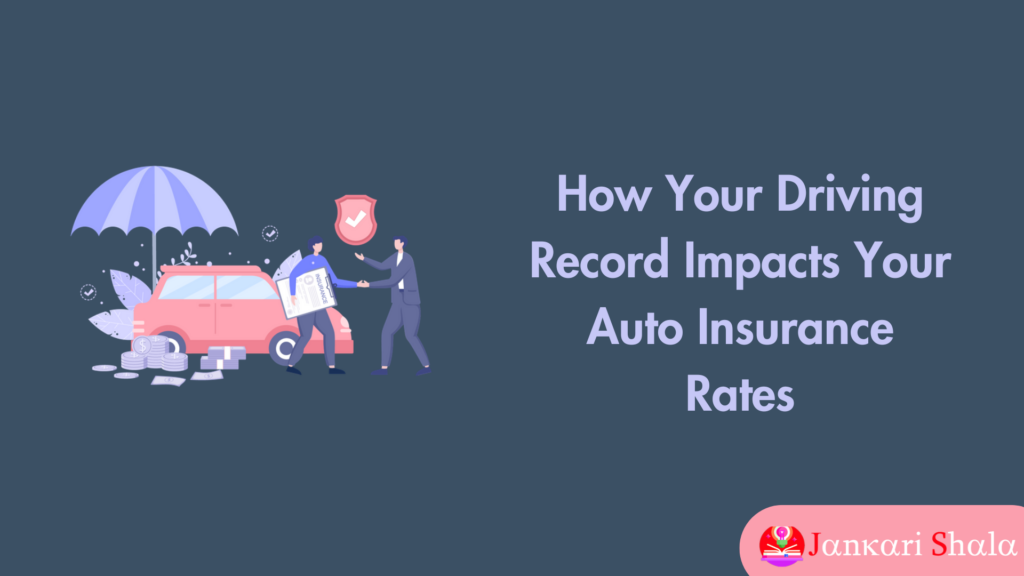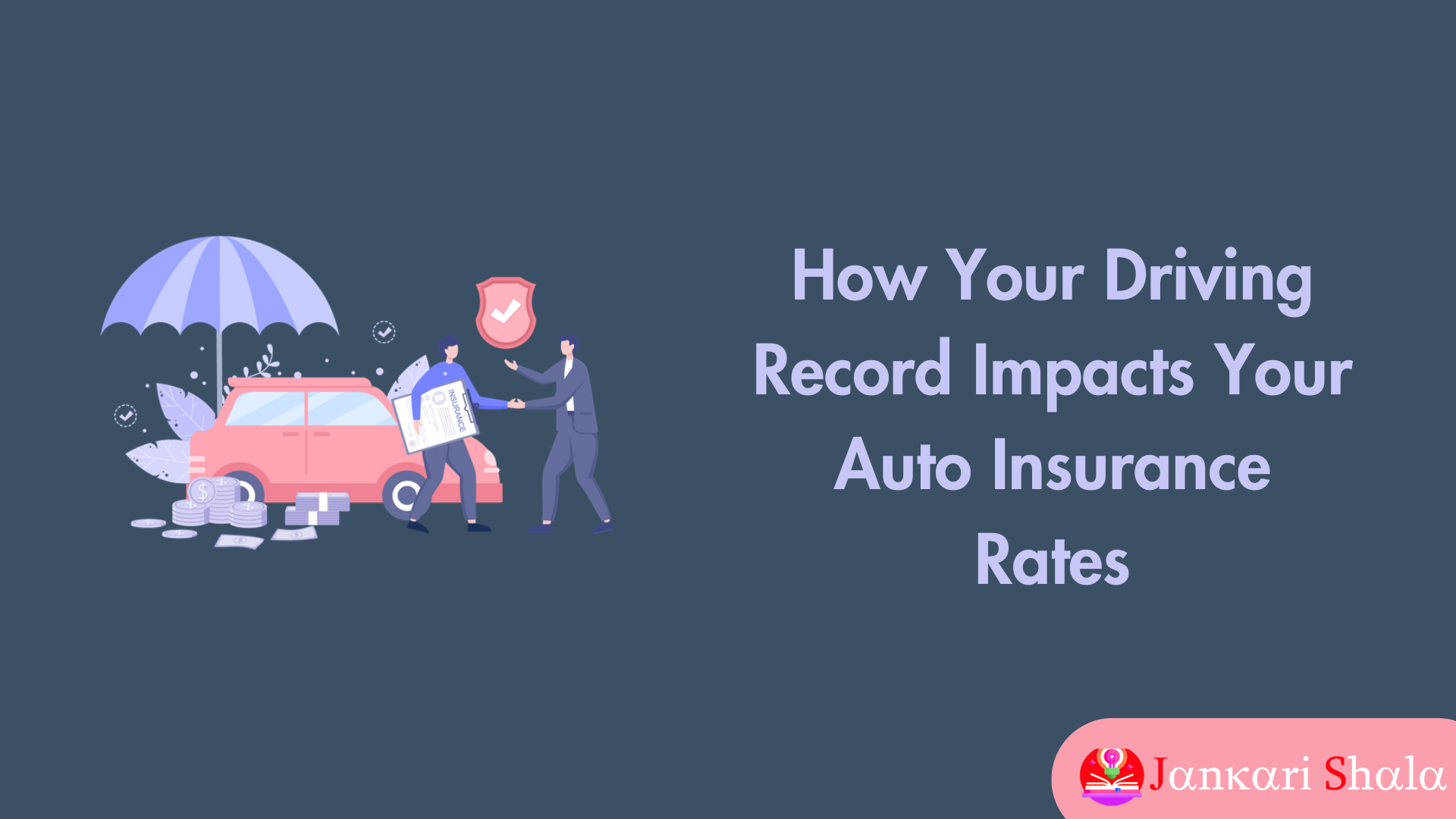Driving isn’t just a means of getting from point A to point B; it’s also a factor that significantly influences how much you pay for auto insurance. Your driving record is like a report card that insurers use to assess the risk you pose as a policyholder. In this extensive guide, we’ll delve deep into the nuances of how your driving history affects your insurance premiums, combining clarity with humor to make this journey both informative and enjoyable.

Understanding Auto Insurance Rates
Auto insurance rates are not arbitrary numbers; they are meticulously calculated based on various risk factors, with your driving record being one of the most critical. Insurers use this information to gauge the likelihood of you filing a claim in the future. A clean driving record suggests you’re a responsible driver, while a spotty one might indicate otherwise.
The Basics of Insurance Premiums
Auto insurance premiums are influenced by several factors, including your age, location, vehicle type, and most importantly, your driving record. Insurers evaluate these factors to determine how likely you are to cost them money in claims. The cleaner your driving record, the lower your perceived risk, and consequently, the lower your premiums.
Impact of Traffic Violations
Traffic violations are like red flags to insurance companies. They include speeding tickets, running red lights, illegal turns, and more. Each violation adds points to your driving record and can lead to increased insurance rates. Insurers view these violations as indicators of risky behavior on the road, which could potentially result in accidents or claims.
Types of Traffic Violations
- Speeding Tickets: One of the most common violations that can impact your insurance rates.
- Running Red Lights or Stop Signs: Signals a disregard for traffic laws and safety.
- Illegal Turns: Shows a lack of attention to road signs and rules.
Accidents and Insurance Rates
Accidents are a significant factor in determining insurance premiums. If you’ve been involved in an accident, especially if you were at fault, insurers may raise your rates to reflect the increased risk of future claims. The severity and frequency of accidents also play a role; multiple accidents or more severe ones can lead to higher premiums.
Fault vs. Non-Fault Accidents
Insurance companies typically differentiate between fault and non-fault accidents when determining rate increases. If you’re not at fault, some insurers may not penalize you for the accident, but this can vary widely by company and policy.
DUIs and Serious Offenses
Driving under the influence (DUI) is a serious offense with severe consequences, including substantial increases in insurance premiums. Insurers view DUIs as a significant risk factor because they indicate impaired judgment and a higher likelihood of accidents. In addition to higher premiums, DUI convictions can also lead to license suspension or revocation, further complicating your driving record.
Impact of DUIs on Insurance Rates
- Immediate Rate Increases: Expect a significant spike in premiums following a DUI conviction.
- Long-Term Consequences: DUIs can impact your rates for several years, even after the offense is no longer on your driving record.
Points and Demerits System
Many states use a points or demerits system to track traffic violations. Each violation adds points to your driving record, which can stay on your record for several years, depending on state laws. Insurance companies often use these points as an additional factor when calculating premiums. The more points you accumulate, the higher the perceived risk you pose, leading to increased insurance rates.
Impact of Points on Insurance Premiums
- Accumulation of Points: More points mean higher insurance premiums.
- Reduction of Points: Completing defensive driving courses or maintaining a clean record can help reduce points and potentially lower premiums.
Insurance Companies’ Perspective
From an insurer’s perspective, your driving record serves as a predictive tool. It helps them assess the likelihood of future claims and set appropriate premiums. A clean driving record indicates responsible behavior and reduces the likelihood of you filing a claim. In contrast, a history of violations or accidents suggests higher risk, leading to higher premiums to offset potential future costs.
How to Improve Your Driving Record
Improving your driving record is not only beneficial for safety but also for your wallet. Here are some tips to help you maintain a clean driving record and potentially lower your insurance premiums:
Defensive Driving Courses
Taking a defensive driving course can not only improve your driving skills but also demonstrate to insurers that you’re committed to safe driving. Many insurance companies offer discounts for completing these courses, so it’s a win-win situation for safety and savings.
Traffic Law Compliance
Obeying traffic laws is crucial for maintaining a clean driving record. This includes following speed limits, using turn signals, yielding right-of-way, and avoiding distractions while driving. By being a law-abiding driver, you reduce the risk of violations that can impact your insurance rates.
Avoiding Road Rage
Road rage incidents not only endanger yourself and others but can also result in aggressive driving behaviors that lead to accidents or citations. Staying calm behind the wheel and practicing patience can help you avoid situations that might negatively impact your driving record and insurance rates.
Also Read:
Frequently Asked Questions (FAQs) About Auto Insurance
Q: Can insurance companies see my entire driving history?
A: Yes, insurers typically have access to your complete driving history through state databases and records.
Q: How long do violations stay on my driving record?
A: The duration varies by state and the type of violation. Minor violations may stay on your record for a few years, while more serious offenses like DUIs can remain for much longer.
Q: Will my insurance rates go up if I’m involved in an accident that isn’t my fault?
A: It depends on your insurer and policy. Some insurers may not penalize you for accidents where you’re not at fault, but others might still consider the incident when calculating your premiums.
Q: Can I negotiate my insurance rates if I improve my driving record?
A: While you can’t directly negotiate rates, improving your driving record by completing courses or maintaining a clean record may make you eligible for discounts or lower premiums with some insurers.
Conclusion on Auto Insurance
Your driving record is more than just a list of past infractions; it’s a crucial factor in determining how much you pay for auto insurance. By understanding the impact of traffic violations, accidents, DUIs, and other factors on your insurance rates, you can take proactive steps to improve your driving habits and potentially lower your premiums. Remember, safe driving isn’t just about avoiding tickets—it’s about protecting yourself, others, and your finances on the road.
